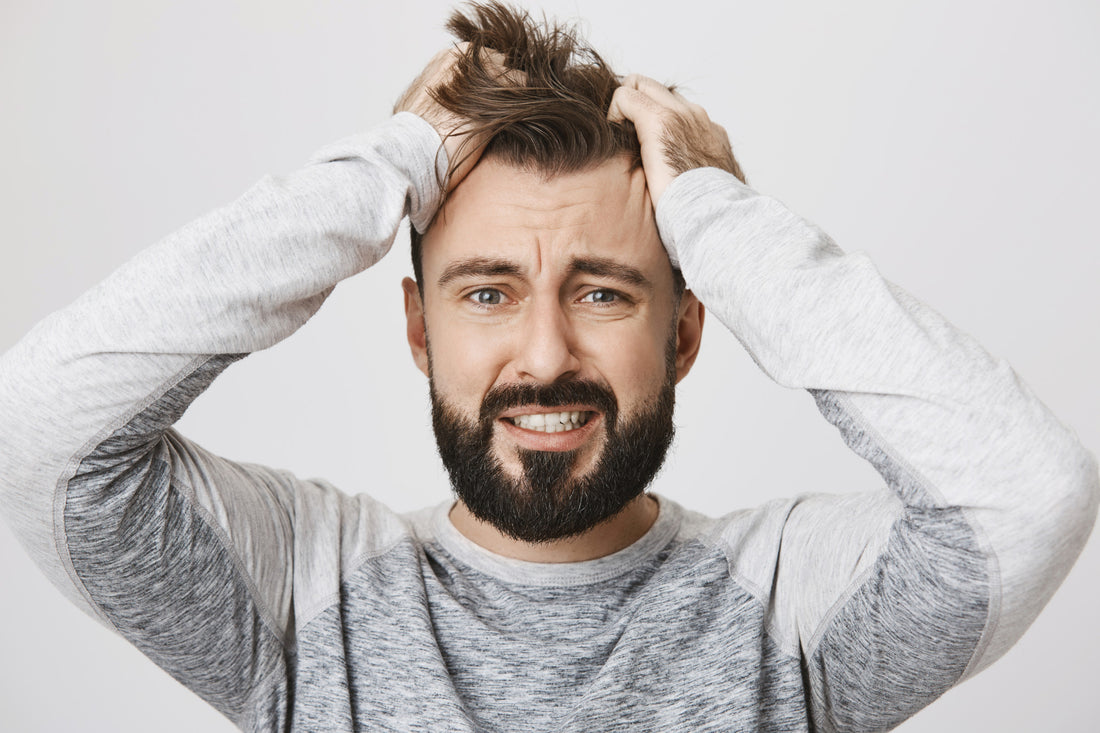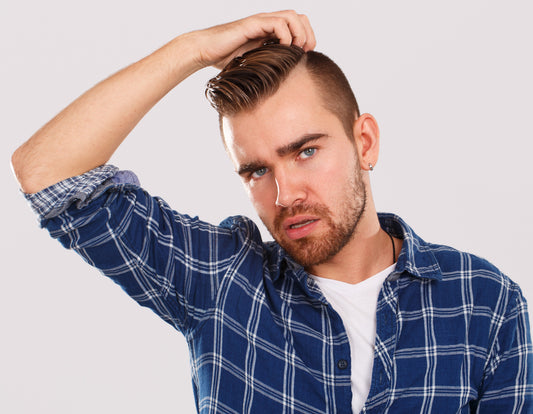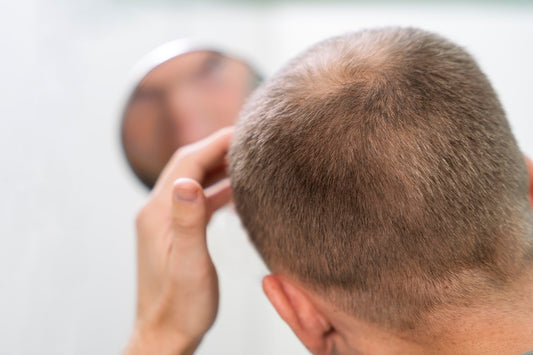Hair loss is a common concern for both men and women. However, men tend to experience hair loss more frequently, and at a younger age, than women.
The increased prevalence of hair loss among men has led to several misconceptions and myths surrounding the causes and treatments.
This guide aims to debunk some of the widespread myths, providing a deeper understanding of the factors that contribute to hair loss in men and the various treatment options available.
Myth 1: Hair loss in men is solely caused by genetics
Debunked: While genetics play a significant role in male pattern baldness, it is not the only contributing factor.

Genetics undoubtedly influence hair loss in men, with male pattern baldness being a hereditary condition. However, hair loss can be a result of multiple factors, including:
- Hormonal changes, particularly an increase in dihydrotestosterone (DHT)
- Stress, both physical and emotional
- Nutrient deficiencies
- Illness or medications
- Scalp infections
- Autoimmune conditions
Understanding that hair loss in men can be triggered by various factors helps open the door to different treatment approaches, rather than just assuming it's an unavoidable genetic fate.
Myth 2: Wearing hats causes hair loss in men
Debunked: Wearing hats does not directly lead to hair loss.
Wearing a hat or other headgear is often associated with hair loss in men, which is not true. Hair loss would only occur if the hat in question were extremely tight, leading to traction alopecia (hair loss caused by pulling on hair).

Normal hat-wearing habits or styles will not lead to hair loss, but ensure your headwear allows for some breathability, as sweaty, damp environments may cause scalp issues that could potentially contribute to hair loss indirectly.
Myth 3: Cutting or shaving your hair will encourage thicker hair growth
Debunked: Hair regrowth is not influenced by the length or frequency of haircuts.
Cutting or shaving your hair will not stimulate hair growth or increase thickness. Hair growth occurs from the follicles in the scalp, not at the ends. While trimming hair can create an illusion of thicker hair by removing damaged, split ends, it has no effect on the hair's growth or density.
Shaving your hair, on the other hand, removes the tapered ends of the hair shafts, making the regrown hair feel and appear thicker temporarily, but it does not encourage actual hair growth.
Myth 4: Hair loss is only a problem for older men
Debunked: Hair loss can affect men of all ages, even in their twenties or earlier.
While hair loss is more common in older individuals, it can affect men of any age, including those in their teenage years. Men who experience hair loss at a younger age are likely to have a strong genetic predisposition or other underlying factors contributing to their hair loss.

Early detection and appropriate treatment can help slow down hair loss and improve the overall quality of hair, regardless of age.
Myth 5: High testosterone levels are the cause of hair loss in men
Debunked: Dihydrotestosterone (DHT), a by-product of testosterone, is often the culprit, not testosterone itself.
Although hair loss in men is often associated with high testosterone levels, it's necessary to differentiate between testosterone and its by-product: dihydrotestosterone (DHT). DHT is created when testosterone is converted by an enzyme called 5-alpha reductase.
High DHT levels can bind to hair follicles, causing them to shrink and impeding hair growth. While a connection exists between DHT and hair loss, it's not accurate to blame high testosterone levels for hair loss directly.
Men with male pattern baldness may have a higher sensitivity to the effects of DHT, regardless of their testosterone levels.
Myth 6: Frequent hair washing accelerates hair loss
Debunked: Hair washing is not directly responsible for hair loss; overzealous washing may contribute to hair breakage.
Hair washing doesn't cause hair loss. The hair you see in your drain or on your hands after washing is often hair that has reached the end of its growth cycle and was already shedding.
Overzealous washing or using harsh products can cause hair breakage, leading to the appearance of more hair loss. Stick to a gentle shampoo and be mindful of scrubbing your scalp.
Myth 7: Scalp massage can prevent hair loss
Debunked: Although scalp massage can improve circulation and promote relaxation, it is not an effective hair loss treatment.
While scalp massage has its benefits, including improving circulation and promoting relaxation, it cannot prevent hair loss or stimulate hair growth.

For individuals experiencing hair loss due to tension, a scalp massage may provide temporary relief, but the effects are unlikely to be long-lasting or remedy hair loss altogether.
Myth 8: Sun exposure is the primary cause of hair loss
Debunked: Sun exposure can damage hair, but it is generally not the main cause of hair loss in men.
Ultraviolet (UV) rays from sun exposure can damage the hair by breaking down the proteins that make up the hair shaft, making it brittle and prone to breakage.
While excessive sun exposure can contribute to hair damage, it generally is not the primary cause of hair loss in men. Wearing a hat or using hair products with sunscreen can help protect your hair from the sun but addressing the root causes of hair loss is essential for any effective treatment.
Myth 9: Dietary supplements and vitamins can reverse hair loss in men
Debunked: Supplements can help improve hair quality if you have deficiencies, but they cannot reverse hair loss for most men.
Deficiencies in nutrients, such as biotin, zinc, and iron, can lead to hair loss. In such cases, taking supplements that address these deficiencies can help improve hair quality.
However, if you don't have any deficiencies, taking extra supplements will not provide any additional benefit or reverse hair loss. A well-balanced diet is sufficient to maintain hair health for the average person.
Myth 10: Hair loss treatments are not effective for most men
Debunked: FDA-approved treatments have proven successful at preventing and, in some cases, reversing hair loss in men.
There are FDA-approved treatments available that have been proven to be effective at preventing or slowing down hair loss in men, with some even promoting hair regrowth. Examples of such treatments include:
- Minoxidil (Rogaine): An over-the-counter liquid or foam applied directly to the scalp that can stimulate hair growth and slow hair loss. Most effective in the early stages of hair loss.
- Finasteride (Propecia): A prescription oral medication that reduces the levels of DHT in the body, thereby slowing hair loss and potentially promoting regrowth in some men.
- Low-Level Laser Therapy (LLLT): LLLT devices emit red light onto the scalp, stimulating hair follicles and promoting hair growth. This non-invasive treatment has shown promising results for some individuals.
Keep in mind that results may vary, and consistent usage is crucial for any hair loss treatment. Consult a healthcare professional to discuss the most appropriate treatment plan for your specific needs.
Conclusion
Having dispelled the common misconceptions about hair loss in men, it becomes easier to comprehend the complex realities behind it. Identifying the root causes of hair loss and consulting an experienced healthcare professional for treatment will ultimately help mitigate its impact and foster healthier hair growth.
The initial step in addressing hair loss lies in pinpointing the underlying cause. Once that's clear, finding the most suitable treatment option becomes much more straightforward.
In a world brimming with myths and misconceptions around hair loss and treatment, it's crucial to educate ourselves on the facts and make informed decisions about our health.
If you're on the lookout for a seamless solution to maintaining thick, luxurious, and resilient hair, look no further than Mohebi Life's Natural Hair Support Supplement for Men. Our science-backed formulation, anchored in only the purest ingredients like saw palmetto and pumpkin seed oil, holds the key to unlocking your hair's potential.
By incorporating one capsule into your daily routine, you're setting yourself on the path to amplified hair growth and an improved overall structure backed by progressive scientific research. Trust in Mohebi Life to be your partner on the journey to achieving optimal hair health.
FAQs
Why evolutionary do men lose hair?
From an evolutionary perspective, hair loss in men is not entirely understood. Some theories suggest that male baldness signals maturity and dominance, while others propose it's a byproduct of aging or a result of sexual selection. The role of baldness in evolutionary adaptation still requires further research to reach a clear conclusion.
Do some men never lose their hair?
Yes, some men never experience significant hair loss. This is mostly due to genetics, as not all men inherit the genes responsible for male pattern baldness. The degree and rate of hair loss vary significantly among individuals, and some men maintain a full head of hair throughout their lives.
Has a bald man ever regrow hair?
Although uncommon, some bald men may experience hair regrowth. This can occur through natural processes, such as in cases of temporary hair loss from stress, or through medical treatments like minoxidil, finasteride, or low-level laser therapy. However, not all treatments guarantee hair regrowth, and results can vary greatly between individuals.
Does balding mean high testosterone?
Balding does not directly indicate high testosterone levels. Hair loss in men is often associated with dihydrotestosterone (DHT), a byproduct of testosterone. Increased sensitivity to DHT in hair follicles can lead to hair thinning and loss. While there is a link between DHT and hair loss, it is not accurate to equate balding with high testosterone levels.
What percent of males go bald?
Approximately 50% of men will experience some form of hair loss by the age of 50. It is estimated that around 30% of men experience noticeable hair loss starting in their 30s, with the percentage increasing by 10% per decade. By the age of 70, about 80% of men have experienced significant hair loss.



